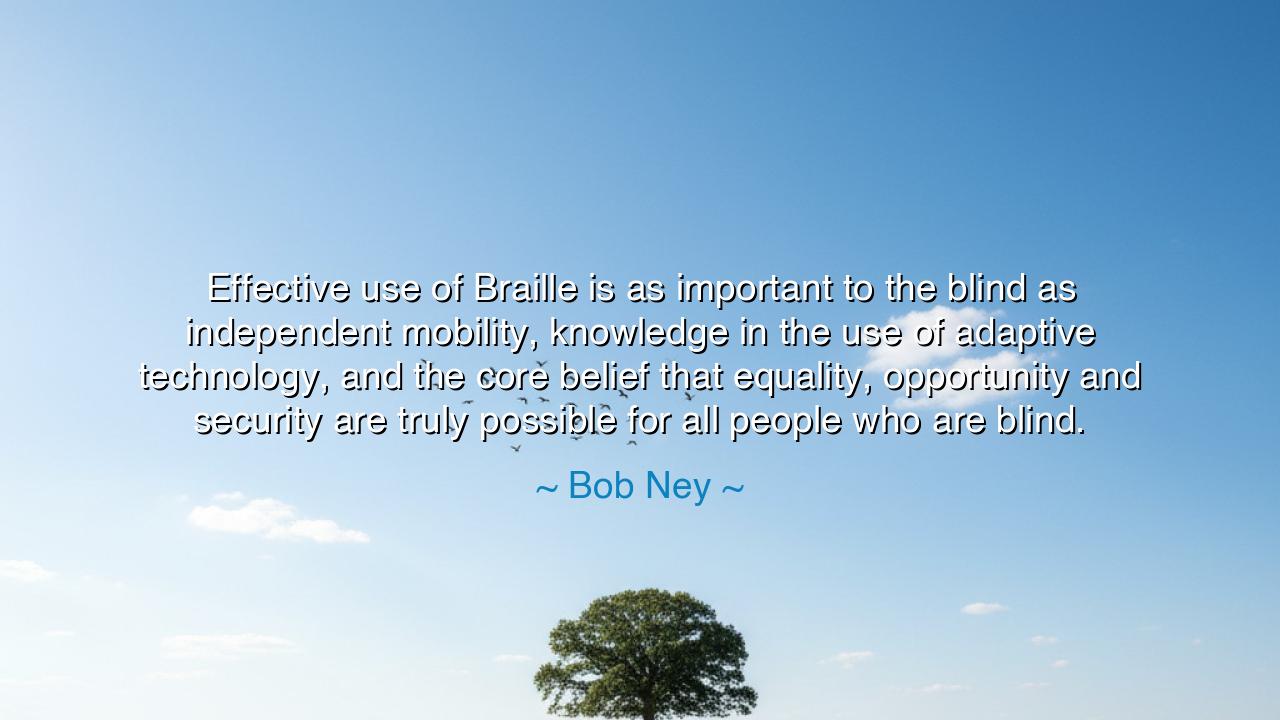
Effective use of Braille is as important to the blind as
Effective use of Braille is as important to the blind as independent mobility, knowledge in the use of adaptive technology, and the core belief that equality, opportunity and security are truly possible for all people who are blind.






When Bob Ney declared, “Effective use of Braille is as important to the blind as independent mobility, knowledge in the use of adaptive technology, and the core belief that equality, opportunity, and security are truly possible for all people who are blind,” he spoke as one who understood that freedom begins with access — access to communication, to education, to dignity. His words are not simply about reading or writing; they are about empowerment. He reminds us that the ability to read in Braille is not a luxury for the blind — it is a pathway to independence, as vital as sight itself. In this single statement, Ney exalts the tools of self-reliance into symbols of human sovereignty, showing that equality is not granted by charity, but achieved through knowledge and self-determination.
The origin of this quote lies in Ney’s advocacy for disability rights and his efforts to expand access to Braille literacy programs in the United States. As a legislator, he recognized that many blind individuals were being denied opportunities simply because society had failed to provide the resources they needed to succeed. His words emerged from a time when technology was rapidly evolving — talking devices, digital readers, and screen-access tools were becoming more common — yet Ney understood that technology alone cannot replace literacy. To know Braille is to know language itself, to hold in one’s hands the keys to knowledge, expression, and confidence. In this way, Ney’s message is both practical and profound: it celebrates Braille not as an accommodation, but as a birthright.
In the ancient sense, Ney’s words speak to a universal truth: that every form of civilization depends upon the ability of its people to communicate with clarity and move with independence. Just as writing was once the foundation of philosophy and law, so Braille is the foundation of intellectual freedom for those without sight. To deprive the blind of Braille is to silence their voices; to teach it is to awaken their power. This mirrors the wisdom of the ancients who taught that learning is the truest liberation — that he who masters the art of understanding can never again be enslaved by circumstance.
History offers us the shining example of Louis Braille, the young Frenchman who, at the age of fifteen, invented the tactile reading system that bears his name. Blinded by accident as a child, he refused to surrender to darkness. His invention — dots raised upon paper, simple yet profound — became the bridge between blindness and the world of ideas. Through Braille, generations of blind men and women gained the power to read scripture, compose music, study law, and write poetry. The world changed because one person believed that literacy is freedom, and that knowledge belongs to all. In Ney’s words, we hear the echo of Braille’s spirit: that equality is not granted by compassion but earned through empowerment.
When Ney mentions “independent mobility” and “adaptive technology,” he speaks of the other pillars of autonomy — the ability to move through the world without fear and to wield the tools of modern society with confidence. Yet even these are not enough, he insists, without the core belief that equality and opportunity are possible. For the greatest barrier is not blindness, but the blindness of society — the refusal to see potential where the eye sees difference. Ney calls upon the blind not only to master their tools, but to believe in their own sovereignty, to stand as equals in every sphere of life. His message is both a call to action and a rebuke to complacency: equality is not inevitable; it must be cultivated, defended, and lived.
In his words, one can sense both reverence and challenge. He honors the dignity of the blind, yet warns against the soft tyranny of pity. The ancients taught that to pity without empowering is to wound twice — once through neglect, and again through condescension. Ney’s vision, by contrast, is rooted in respect. He urges a world where no one is defined by limitation, where the blind may read with their fingers, move with confidence, work with skill, and live with purpose and pride. In this, his quote transcends its moment in history and becomes a timeless truth about all who struggle for independence.
Let this teaching be passed to future generations: knowledge is the cornerstone of freedom, and literacy, in any form, is its highest expression. Whether written on paper or raised in dots, words are the instruments of thought, and thought is the guardian of dignity. Therefore, let us ensure that every person — sighted or blind — is given the means to learn, to move, to create, and to believe in their own potential. For when all people can read, speak, and walk freely, then humanity itself stands illuminated — not by the light of the eyes, but by the light of the mind and spirit.






AAdministratorAdministrator
Welcome, honored guests. Please leave a comment, we will respond soon